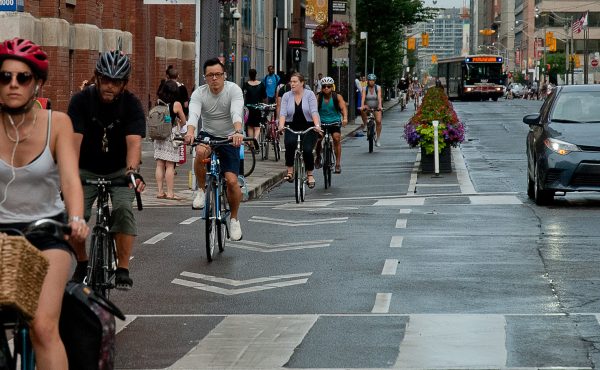

In the wake of Thursday’s consultapalooza, numerous pundits delighted in observing that all but three of the 169 deputants who toughed out the epic session opposed the sweeping budget (re: service) cuts envisioned in the KPMG documents. No one came to defend Ford-friendly expenditures, such as keeping the Don Valley Parkway properly paved or spending millions on studies to justify the mayor’s fantasy Sheppard subway scheme.
In the UFC showdown between the War On The Car™ crowd and the War For The Library set, Team Atwood appears to have scored a knock-down win. Gotcha, Robbie.
Team Ford bluffly responded that Ford Nation didn’t come out to make its populist voice heard because its denizens were hard at work, earning a living.
Well, you know what? The vast majority of Miller’s Minions — or whatever one wants to call Toronto’s progressive centre-left — didn’t show up for pretty much the same reason. So while I applaud the citizens who endured this 22-hour circus, I certainly cannot blame anyone, of any political persuasion, for taking a pass, thanks.
Indeed, even if Ford and the executive committee had adopted a slightly less survivalist approach — a two-day session in the relative comfort of the council chamber — the basic structure of the process is absurd, if not completely insane.
Yes, I understand that some political theatre is necessary, and also that politicians sometimes can only be persuaded when confronted directly, and emotionally, with the consequences of their decisions. And so the session did have its highlight reel moments – the acerbic older ladies; the young man who read out a parable about eliminating the foundations of the “House of Toronto”; and of course the 14- year-old Scarborough girl who wept as she told the committee, at 2 a.m., about her deep affection for her local library and her fear of losing the same.
But for me, these highlights had the feel of a cheap sugar high, delivering a short-lived surge of political adrenalin. As for the politicians, if they were paying attention at all, they mostly seemed interested in scoring points, as usual. Is there that much sunlight between Janet Davis’ sarcastic queries — “Is food a nice-to-have or a must-have?”— and Giorgio Mammoliti’s hectoring cross-examinations?
If council and city officials actually cared about soliciting the views of residents — which is by no means certain — they should use last week’s debacle as an excuse to detonate Toronto’s ossified public consultation model and start over. As a foundational principle, I’d suggest the following: avoid approaches that make it exquisitely difficult for most residents to participate.
Which means: Weekend or evening sessions, held out in the city rather than within Fortress City Hall. A restructured consultation process that encourages debate, compromise and facilitated interaction instead of mind-numbing parades of deputants. And greater reliance on electronic media to convey residents’ views.
Would it be so difficult for the city to set up video-equipped computer terminals at library branches, for example, so residents can record their feedback in ways that don’t necessarily involve composing emails? Citytv’s Speaker’s Corner, may it rest in peace, is certainly a model worth emulating.
I also find myself wondering whether the city could do a better job capturing, on a routine basis, feedback from residents who use specific municipal services. The city sends out hundreds of thousands of property tax and utility bills. Would it be so difficult to include a survey form and a pre-paid envelope? Or could the city take a page from the consumer products sector and conduct focus groups with, for example, library patrons, parents of kids enrolled in parks programs, and even commuters? If city bureaucrats could share quantifiable data with elected officials, perhaps they’d have a keener sense of what works and what needs to be fixed, which, really, is what this debate is all about.
Dave Meslin recently pointed out to me that the city’s public consultation notices, regularly printed in the newspapers in tombstone ads, could scarcely be less inviting. The notices make no concessions to interesting design or readability, and are difficult even for aficionados to decipher. What, he asked, would happen if consumer goods companies took the same approach when promoting their products? They wouldn’t sell anything, that’s what. Which is what we do.
None of these complaints are new, but the absurdist quality of the current budget debate has brought them to the fore. We find ourselves at an Alice-in-Wonderland moment, where the powers-that-be assure us that those who speak up don’t represent those who don’t, and this despite repeated, but unconvincing, efforts by the Ford administration to solicit the views of the governed.
Long before Ford became mayor, the city and council had a tin ear when it came to listening to residents. If there was ever moment to begin fixing a system that is broken beyond repair, this is it.
photo courtesy of West Annex News




11 comments
John, I think your ideas around sending out surveys with tax/water/etc bills and doing focus groups are great ideas, as well as having more opportunities for direct engagement through meetings held in the various regions of Toronto. But some of these ideas were tried during the Core Services Review to some degree or another — particularly electronic surveys and regional meetings — and were then deemed irrelevant by the powers that be because those tactics didn’t produce the results desired. For that reason, I think it’s important that no matter what additional instruments the City adds to its engagement toolbox (and it should add), the deputation process must remain in tact. Frankly, few members of council bothered to truly listen to the 169 people who were speaking right there in front of them last Thursday/Friday so I’d hate to think how quickly some might discard a DVD of Speakers Corner-like statements.
It looks to me like a lot of Toronto councillors are “getting away with murder” when all the attention is directed elsewhere. This happened in the Miller Administration too. I think that is where things are going wrong and not enough attention is being paid to it. For example, what compelled Cllr Mammoliti to grandstand and beg for the largest flagpole in North America last August? How did it happen that Cllr Stintz last month closed-off a street at YE ‘Without Notice’ and without communications or consultations with local residents? Why did Cllr Robinson leave behind $million$ that could have gone to the Library Board coffers?
These are fine suggestions, if the intent is to promote participatory democracy.
Unfortunately, the right wing clown show running this city is not interested in that at all – and in fact, is downright dismissive of it. Someone gets Rob Ford on the phone to complain about payint $0.05 for a plastic bag? He’s right on that like a dog (or a Rob Ford) on a bone.
Scores of people camp out through the night to pour out their hearts in well thought out deputations? Rabble rousing unemployed trouble makers.
These guys are so contemptuous they don’t even hide it. Mammoliti made it clear that the very intent of the all night sitting was to wage a war of attrition to minimize the number of presentations.
i’m thinking ahead. Besides electoral reforms, which are a separate discussion, the two big fixes that should be put before the voters in 2014 are changes in the public consultation process — let’s ask Nenshi how to do it! — and the adoption of a Toronto version of NYC’s local planning board model, as proposed by Paul Bedford and others. In both cases, the goal is to change the way the city interacts w/ residents, and to change the way council listens. I fully recognize that the Fords aren’t interested in views that don’t support their own. But their indifference creates an opportunity for a civic-minded politician who truly aspires to do better.
While John Lorinc’s suggestions would make public participation easier and more up-to-date, in the end Rob Ford has to WATCH the video footage in order to receive the messages. It’s doubtful he (or anyone) would do that. Cumbersome public presentations such as last week’s marathon at least ensure that the mayor actually heard the messages — there are all the witnesses to testify to it.
John,
You do make some good suggestions, but I think you understate the value of the processes we do have in place. I and most of my colleagues are out in the community at public meetings a number of days every week all year. We consult on development, traffic, social services etc. In that work I learn a lot about the communities aspirations and interests and yes its tensions. Further, and perhaps more important, community members learn from one another and negotiate.
Something similar happens at deputations. I learn a lot about how issues impact people. Come watch Toronto East York Community Council to see how instructive deputations can be.
The most important thing though is deputants listening to one another. If there is a gap in our civics it is the lack of conversation. Folks talked to each other about the kind of City they want both formally at the mike and informally in their seats.
Granted high stakes battles such as the one last week over whether to shrink government and taxes are not settled in one round of deputations (the way a fence exemption might be at TEYCC) but the conversation is enriched. Minds are focussed (make a dep some time – explaining one’s views in a few minutes requires a lot of reflection). Alliances are built. Compromises are envisioned. We all learn.
Something important happened through the winter budget consultations and the recent round concerning the KPMG. Thousands of people gave their best few minutes of argument about the City they want. They were heard by their elected representatives and a roomful of strangers. I can’t think of anything that builds a stronger body politic and therefore a stronger City.
If this is theater then it meets the standards of the best theatre. We talked about Toronto. We laughed. We cried. It became a part of us
Cheers,
Gord
“Is there that much sunlight between Janet Davis’ sarcastic queries — ‘Is food a nice-to-have or a must-have?’— and Giorgio Mammoliti’s hectoring cross-examinations?”
Yes, there is, on account of the fact that Davis scores points through support for initiatives to make the city better, whereas Mammoliti (somehow) scores points no matter how deleterious his behaviour is for the city.
John… while I appreciate your perspectives the reason we elect our councillors is to represent us at Council. There are 40 plus councillors representing upwards of 2.5 million people. Why is it necessary to conduct a referendum everytime something contentious comes up. The City’s fiscal situation is dire, we spend more than we can afford. When you look at your family across the dinner table and announce that times are tough and as a family it is going to be necessary to cut back and reassess priorities do you really expect that because your kids don’t want to that you won’t anyway? Holding a referendum doesn’t let the politicians off the hook when it comes time for the hard choices.
Here’s a link to a story about a good (bike friendly) mayor:
http://www.bbc.co.uk/news/world-europe-14380367
Several good ideas here.
I note, though, as Gord Perks says, that Toronto is actually already fairly good at public consultation – far more so than other levels of government. In addition to the right to make deputations on any subject to standing committees (which can have an influence, at least if the issue isn’t already so politicized), the city holds consultation meetings about a wide range of projects.
For better or worse, the city has also moved to an “open house” model of public consultation that reduces the people-shouting-at-bureaucrats pattern (but makes it harder for people to exchange views and make alliances against a bad idea).
One problem is, it’s hard for anyone to know when an issue they are interested in comes up for a consulation opportunity. As Mez notes, the public notices are easy to miss and inscrutable.
I think the city should have an electronic system whereby people can be notified by email whenever there’s a public meeting relating to a particular postal code area, or a particular subject they are engaged with.
I would like the city to experiment with what I will call, for lack of a better term, video reports. No one questions the fact that someone constructs, writes and edits staff reports, bearing in mind the need for balance and objectivity. But the act of writing always involves authorial choices. So why can’t we experiment with video reports — i.e., hire a director and editor to prepare a video account of a consultation, for example. If residents were invited to leave comments at computer terminals at the libraries, for example, the director/editor team, working in partnerships with the staff person assigned to summerize the feedback, could put together a documentary of sorts that depicts the feedback, but not necessarily just by stringing together a series of clips. The feedback could be structured to draw out themes, giving examples of different categories of comments, etc. This could be presented in council. We have staff give power point presentations all the time, and no one questions that format. I don’t see why the same couldn’t be done with video. It is powerful, immediate, would allow politicians and the public to hear residents in their own voices, but would utilize editing and structure to make the points succinctly. The videos could be posted on a City of Toronto youtube channel (imagine!) with links embedded in the online staff reports. Why not?